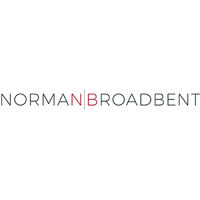Norman Broadbent Plc (LON:NBB) Chief Executive Officer Mike Brennan caught up with DirectorsTalk for an exclusive interview to discuss what they do, their highest annual revenue in 10 years, reduction in bottom line losses and having a more balanced business.
Q1: For those who don’t know of Norman Broadbent, can you explain what it is that you do?
A1: We are 40-year old business, we’re listed on AIM and we’ve got a very got a very strong shareholder register so let me quickly talk you through who’s backing the business. We’ve got Gervais Williams in from Miton, he’s got 6%, we’ve got Ennismore, we have got Judith MacKenzie from Downing Capital, they’ve got 28%, we’ve got John Moulton, a very well-known city investor, he’s personally invested in our business, I think he owns about 12/13%, and then we’ve got a very well-known entrepreneur and business-backer within the recruitment space called Pierce Casey, he’s got 11/12%. So, we’ve got a very very strong shareholder register.
Our investors brought me in just under 3 years ago as Chief Exec and basically, what we needed to do was to turn the business from being a very old well-established but slightly out of date executive search company into something much more relevant to today’s market. So, what we’ve done over the last 3 years, we’ve effectively not shied away from our heritage or that exceptionally strong brand but what we’ve done is created a professional services firm.
We’ve got now five very distinct service lines, one of which is executive search and that accounts for just under 50% of our net fee income.
We have a consultancy business that supplies management consultants and business consultants on a 6/9/12-month basis so they might use them on short-term strategic projects, turnarounds, changing transformation projects. So, where they don’t want to hire a full-time employee or they want to bring somebody in that can give a high level of expertise for a short period of time, they go to our NB Interim business.
We have a solutions business that works at the mid-market level, that works with tomorrow’s leaders, up and coming young talent. So, when you think we’ve got a million managers short in the market, that’s quite a hot market to be operating in and it fits in very well with our overall brand proposition as working with exceptional talent.
We’ve got an assessment business, it puts the science into hiring so it helps you identify the right hires, if they have certain strengths and weaknesses, whether their development needs might be. It also works with existing talent and it helps you make sure that they’re fit for purpose and if there is a development plan, what it should look like so that’s NB Consulting.
We’ve talked about the search business, that works with Chairman’s, Chief Execs, senior business leaders, an extremely well-established business.
Finally, the fifth leg of our business, if you like, that’s research and insight and that provides information to clients, it’s mainly around people, business structures and market intelligence. It provides a lot of de-risking for clients when they’re thinking of entering new markets, maybe building a new business, putting a new budget in place.
So, collectively, they’re a very strong set of propositions and our clients use them individually or they can pull them together in different ways and we can create new solutions that could include one, two or all five of them. So, that’s what we do today.
Q2: So, it’s a very established brand then?
A2: Yes, it’s 40 years old, it’s got a tremendous halo effect and what we didn’t want to do was we didn’t want to lose any of that really strong brand heritage, the brand itself opens a lot of doors.
So, what we’re seeking to do is build this portfolio of additional businesses that can leverage that brand but in a positive way so it’s not dilutive on the brand, if anything it enhances the brand. We now talk about ourselves as being talent acquisition advisors and general talent advisors, so we see ourselves as more of a provider of services as opposed to what we were 3 or 4 years ago which was really a transactional recruitment business.
Q3: Group revenue increased by £2.6 million, up 40% to £9.2 million, this is your highest annual revenue for over 10 years. What’s driven that?
A3: You’re right, they are the best revenues we’ve posted for over 10 years and that’s a combination of facts actually. We’ve invested heavily in the business, we invested for the long-term and those investments are now starting to come through.
If you look at the revenue numbers for 2017, you’ve just compared them, obviously they were a lot lower than they were in 2018 and that’s as a direct result, I think, of a number of different things. We’re more relevant, we have more clients so more clients are using us today than they were a year or so ago, we have more repeat clients who are coming back and using us for different things, and we have more and better people that work with us.
So, we’ve invested quite heavily and that’s obviously driven sales up, it shows that what we have to offer is interesting, it’s relevant, and we also have more things to sell as I mentioned earlier on, we really used to focus on one thing which was transactional recruitment and now we have five. The fact is they are directly relevant to what our clients want and need, and our clients are coming back and buying them off us, it’s not just driving the revenue which was up 40% but we’ve also got net fee income as well and that was up about 32% year-on-year.
Q4: You reduced bottom line losses very significantly, you reduced losses by about £1 million, that’s a huge swing. Was that through cost cutting?
A4: No. Again, we’ve done a number of different things and it’s essentially lots of different thing we did all coming together at the same time.
We’ve hired an exceptional talented CFO, he joined us last year, Will is our CFO, he’s got over 15 years’ experience in this sector and he’s run some very big businesses. So, Will is not only our CFO but he’s our Chief Operating Officer so he’s got his hands on lots of levers and he and I work together exceptionally well.
Will has brought a number of things into the business in terms of management information, he’s shone a light on a lot of things so we’re looking at efficiencies. We’ve driven efficiencies through, we moved out of our old offices in a very expensive part of London and we moved to a set of offices which are just as good, they’re in a great part of London, very central, but they’re just more efficient. So, we’re using our office space better, so we’ve managed to save about £300,000 a year just in office costs alone.
Really, we haven’t stopped investing and, as I said earlier, a lot of that impact on the bottom line has come through not just careful cost management but because of that heavy investment, we’re now starting to see sales come through. So, if we scale our business, a lot of those sales just drop straight through to the bottom line and because we’ve had a big uptick in terms of revenue and net fee income, that’s why we’ve seen that swing at the bottom line.
Now, you’re right, to reduce our losses by £1 million, so that’s 55% to the better, that’s a huge swing and when you think that we’ve managed to achieve that without slashing costs, cutting offices and whilst we’ve been growing and investing in the business, that’s quite a considerable feat, I think. That’s why we’ve had a number of our shareholders actually contacting me today, after these results, to say congratulations, keep it up.
Q5: You talk about having a more balanced business, what does that mean and how does that benefit the Norman Broadbent investors?
A5: So, it’s been a theme of mine since I came into the business a few years ago, we used to get 79% of our business from executive search and executive search is a big lumpy business, you don’t get an awful lot of forward view on it so you can’t really plan very well, the revenue itself is not guaranteed so it tends to attract quite low investment multiples and it can be quite risky.
So, what we set about doing was bringing new revenue streams into the business and creating more of a balance so in other words, we’re not putting all of our eggs in one basket. As I said earlier, we’ve now got executive search to a point where it’s just below 50% and then we’ve got other revenue streams coming through; we’ve got research and insight, we’ve consulting we’ve got interim and we’ve got solutions. So, that means that if one part of market catches a cold, we’ve got other parts of the business that can create more balance so they can give it a bit more financial protection.
In addition to that, typically executive search firms have tended to attract very low investment multiples and that’s because of the quality of the revenue and it’s all to do with line of sight. What we’ve now got in the business is we’ve got a business which has now got these five different revenue streams in, one of which is interim where you’ve got 6/9/12 months’ worth of visibility over contract income coming in every month for the length of the contract. Not only does it give greater stability to the business, but it attracts higher investment multiples.
So, what we’re thinking of is now that we’ve got the business to a point where just under 50% of our work comes from executive search, the majority of it comes from higher quality revenue then we think the city should be looking at us again and saying ‘actually, we need to be revalued’. They need to be applying a different set of valuation metrics to us and obviously, if they do that then that’s going to be a huge benefit to our investors who should benefit, if there is that revaluation, from that in terms of the movement in the valuation of the business.






































